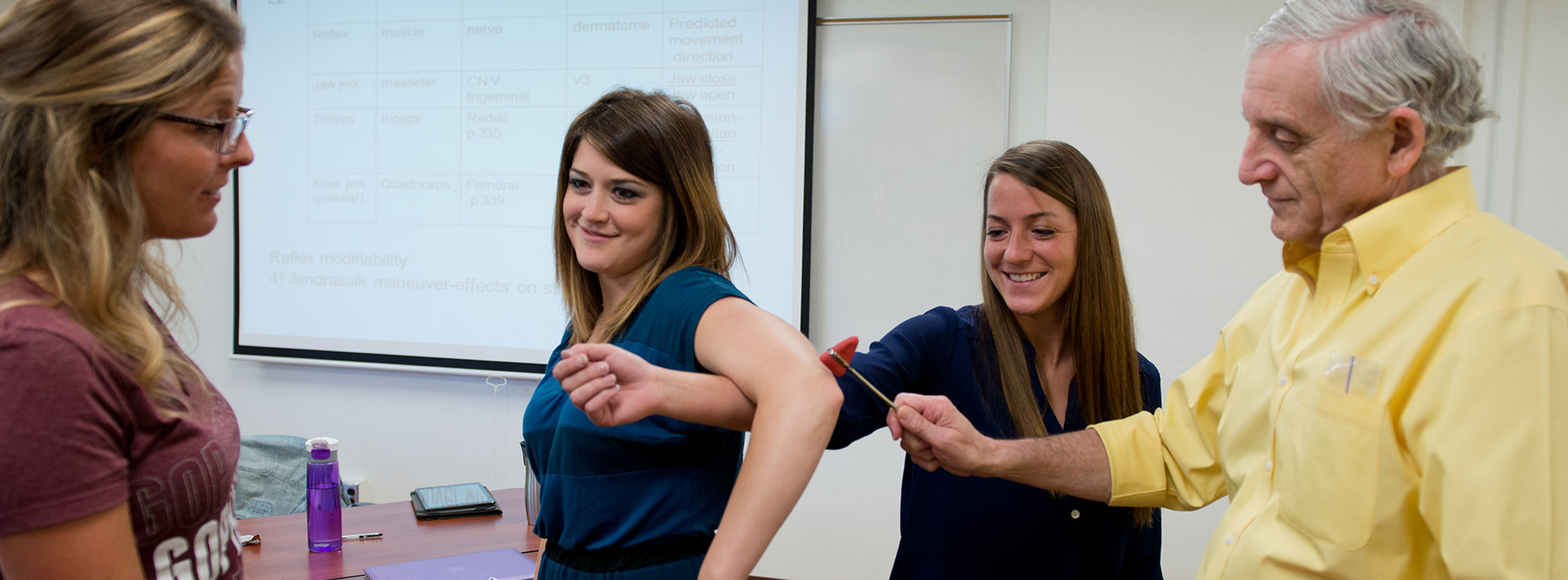Hybrid Curriculum
The curriculum uses a hybrid educational approach that blends distance (technology-enhanced) and on-site, face-to-face instruction and interaction with other students and faculty. Our lengthy history delivering curriculum in a hybrid learning format – both in-class and online – has contributed to outstanding academic outcomes, and a seamless transition to off-site learning during the Covid-19 pandemic.
Check out the course sequence page for specifics about face-to-face times on campus.
Students must complete 24 weeks of Level II fieldwork as well as an individual 14-week doctoral capstone experience within 24 months following their completion of the Level I fieldwork and classroom portions of the program. The doctoral capstone experience begins once all coursework, Level II fieldwork and preparatory activities are completed.
Objectives of the Program
Evaluate Models, Policies and Systems
The student will:
Evaluate models, policies and systems in settings where occupational therapy services are emerging or delivered.
With the goal of learning to:
- Appraise current and future directions for health care, education, and social service systems that guide practice and service.
- Critique health, education, employment, academic and community models that structure emerging OT services.
- Create innovative practice in emerging OT settings.
- Analyze policies and develop, formulate procedures for effective OT services.
Evaluate Evidence
The student will:
Evaluate evidence to drive innovative practice for individuals, communities, and populations.
With the goal of learning to:
- Apply ethical guidelines to complex practice situations. Identify a problem for a population-, community- or individual- level practice related problem or question.
- Appraise evidence relevant to the question or problem and reframe their questions accordingly.
- Formulate a research proposal around their practice-related problem or question.
Achieve Proficiency
The student will:
Achieve proficiency in one of the following areas of advanced practice: clinical practice, research, administration, leadership, program and policy development, advocacy, education, or theory development.
With the goal of learning to:
- Evaluate outcome(s) of their proposed approach.
- Compare and contrast 3-4 potential specialty practice areas.
- Investigate knowledge, skills and attitudes needed to possess emerging expertise in specialty area.
- Select specialty [advanced] practice area.
- Develop capstone project in selected specialty area.
- Formulate specific individualized capstone objectives and plan.
- Develop the knowledge, skills, and attitudes needed to possess emerging expertise in specialty [advanced] practice area.
Inspire, Empower and Lead Others
The student will:
Inspire, empower and lead others to be agents of beneficial change.
With the goal of learning to:
- Demonstrate emerging expertise through the application of knowledge, skills, and attitudes in specialty area.
- Understand leadership practices and how they impact behavior of individuals and groups in organizations. examples across multiple contexts.
Experiential Learning
Level I Fieldwork
Level I fieldwork experiences are attached to several courses during semesters one, two, four, and five. Level I experiences provide the opportunity to apply course learning in a practice context under the supervision of faculty. Faculty led Level I Fieldwork experiences - according to the Accreditation Council for Occupational Therapy Education (ACOTE) - is to introduce the fieldwork experience and allow application of knowledge to practice while developing understanding of client needs.
Level II Fieldwork
Level II fieldwork courses occur toward the end of the didactic curriculum and takes place during in semesters six, seven, or eight. Each student is required to register fot two Level II Fieldwork courses. Level II fieldwork supports development of a generalist occupational therapist. Students participate in a variety of settings and with a variety of populations. Fieldwork aligns with the curriculum design and consist of a minimum of 24 weeks full time equivalent experience. This is typically arranged into two-twelve week experiences with an option of three-eight week experiences. It is the policy of the University of MN that all level II fieldwork must be completed within 24 months of finishing the didactic semesters.
Demand for fieldwork sites is at an all-time high. More students are competing for fewer fieldwork placements; a result of high demand for occupational therapists and changing productivity standards for fieldwork educators. Level II fieldwork planning begins before matriculation and continues up to and beyond notice of your placements.
Level II fieldwork is an integral part of entry-level occupational therapy education, requiring careful placement of students into experiences. Placement decisions align with the University of Minnesota, University Health Sciences, Occupational Therapy, and OT curriculum design. In addition, all sites require an Affiliation Agreement, which is a legal document negotiated between the University of Minnesota and the fieldwork site.
Capstone Experience and Project
The Doctoral Experiential Component and Capstone Project are the culmination of doctoral preparation for occupational therapy students. These individualized experiences provide the student an opportunity to further develop their professional skills in an area of advanced practice; carry out a scholarly capstone project and to disseminate the results; and to promote the profession. Areas of advanced practice include: clinical practice skills, research skills, administration, leadership, program and policy development, advocacy, education, and theory development. Each student works in collaboration with a Capstone faculty advisor to plan and implement their experience and project.
Capstone experiences require 560 hours (14 week full-time equivalent) within a setting that aligns with a selected advanced practice area to be started after completion of all coursework and Level II fieldwork.
The Capstone project is an independently mentored project that partially fulfills the requirements for a clinical doctoral education and is completed within the Capstone experience. Students implement a data-driven scholarly project designed to benefit the site of the experience. Learners will disseminate results of their project to site stakeholders and to faculty in a presentation format at the end of the experience.
